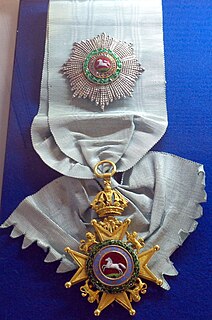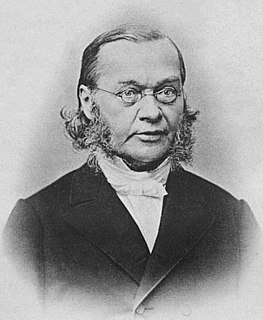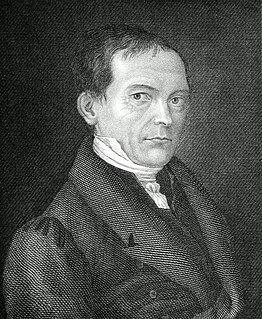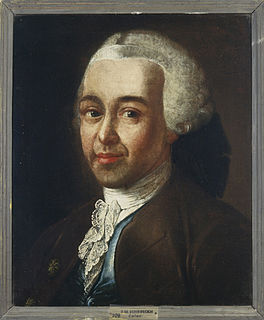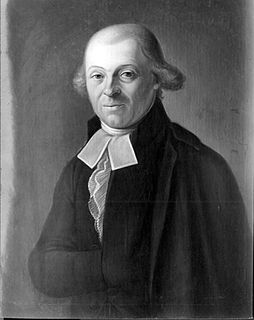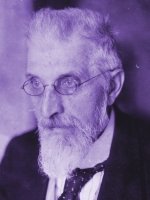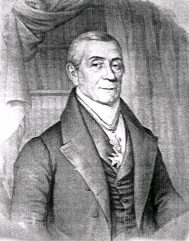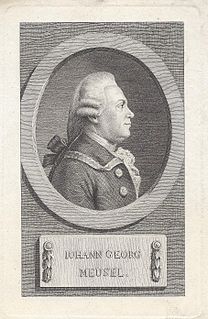Biography
He was born at Petershagen, near Minden, where his father, Georg Christof Friedrich, was preacher. In his tenth year he entered the orphanage at Halle, from which he duly passed to the university, his studies being interrupted in October 1813 by a period of military service, during which he was enrolled as a volunteer in a regiment of chasseurs. On the conclusion of peace (1815) he returned to Halle, and, having in 1817 taken his degree in philosophy, he became assistant head (Conrector) of the Minden gymnasium, and in 1818 was appointed director of the gymnasium at Cleves.

Petershagen is a town in the Minden-Lübbecke district, in North Rhine-Westphalia, Germany. It lies on the Westphalian Mill Route.

Minden is a town of about 83,000 inhabitants in the north-east of North Rhine-Westphalia, Germany. The town extends along both sides of the River Weser. It is the capital of the district (Kreis) of Minden-Lübbecke, which is part of the region of Detmold. Minden is the historic political centre of the cultural region of Minden Land. It is widely known as the intersection of the Mittelland Canal and the River Weser. The town is over 1,200 years old and has yet some buildings in the Weser Renaissance style, in addition to its architecturally symbolic 1,000-year-old cathedral.

Philosophy is the study of general and fundamental questions about existence, knowledge, values, reason, mind, and language. Such questions are often posed as problems to be studied or resolved. The term was probably coined by Pythagoras. Philosophical methods include questioning, critical discussion, rational argument, and systematic presentation. Classic philosophical questions include: Is it possible to know anything and to prove it? What is most real? Philosophers also pose more practical and concrete questions such as: Is there a best way to live? Is it better to be just or unjust? Do humans have free will?
Here he published his earliest work (Historisch-kritischer Versuch über die Entstehung u. die frühesten Schicksale der schriftlichen Evangelien), a treatise which had considerable influence on subsequent investigations as to the origin of the gospels. In 1819 Gieseler was appointed a professor ordinarius in theology in the newly founded University of Bonn, where, besides lecturing on church history, he made important contributions to the literature of that subject in Ernst Friedrich Karl Rosenmüller's Repertorium, KF Stäudlin and HG Tschirner's Archiv, and in various university "programs."

Theology is the critical study of the nature of the divine. It is taught as an academic discipline, typically in universities and seminaries.

The University of Bonn is a public research university located in Bonn, Germany. It was founded in its present form as the Rhein University on 18 October 1818 by Frederick William III, as the linear successor of the Kurkölnische Akademie Bonn which was founded in 1777. The University of Bonn offers a large number of undergraduate and graduate programs in a range of subjects and has 544 professors and 32,500 students. Its library holds more than five million volumes.
Ernst Friedrich Karl Rosenmüller was a German Orientalist and Protestant theologian.
The first part of the first volume of his well-known Church History appeared in 1824. In 1831 he accepted a call to Göttingen as successor to GJ Planck. He lectured on church history, the history of dogma, and dogmatic theology. In 1837 he was appointed a Consistorialrath, and shortly afterwards was created a knight of the Royal Guelphic Order. The fifth volume of the Kirchengeschichte, embracing the period subsequent to 1814, and Dogmengeschichte, sometimes regarded as a sixth volume of the Church History, were published posthumously in 1855 by ER Redepenning (1810–1883), followed finally by the fourth in 1857. Less vivid and picturesque in style than Karl Hase, lacking August Neander's deep and sympathetic insight into the more spiritual forces by which church life is pervaded, he excels these and all other contemporaries in the fulness and accuracy of his information. His Lehrbuch der Kirchengeschichte, with its copious references to original authorities, is of great value to the student: "Gieseler wished that each age should speak for itself, since only by this means can the peculiarity of its ideas be fully appreciated." (Otto Pfleiderer, Development of Theology, p. 284).

The University of Göttingen is a public research university in the city of Göttingen, Germany. Founded in 1734 by George II, King of Great Britain and Elector of Hanover, and starting classes in 1737, the Georgia Augusta was conceived to promote the ideals of the Enlightenment. It is the oldest university in the state of Lower Saxony and the largest in student enrollment, which stands at around 31,500.

Gottlieb Jakob Planck was a German Protestant divine and historian. He was the great-grandfather of physicist Max Planck.
Dogma is an official system of principles or doctrines of a religion, such as Roman Catholicism, or the positions of a philosopher or of a philosophical school such as Stoicism.
This page is based on this
Wikipedia article Text is available under the
CC BY-SA 4.0 license; additional terms may apply.
Images, videos and audio are available under their respective licenses.
